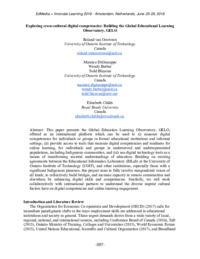Exploring cross-cultural digital competenciesBuilding the Global Educational Learning Observatory, GELO
Roland van Oostveen, Maurice DiGiuseppe, Wendy Barber, Todd Blayone, Elizabeth Childs
Zu finden in: EdMedia 2018, 2018
|
 |
 Diese Seite wurde seit 5 Jahren inhaltlich nicht mehr aktualisiert.
Unter Umständen ist sie nicht mehr aktuell.
Diese Seite wurde seit 5 Jahren inhaltlich nicht mehr aktualisiert.
Unter Umständen ist sie nicht mehr aktuell.
 Zusammenfassungen
Zusammenfassungen
This paper presents the Global Education Learning Observatory, GELO, offered as an international platform which can be used to (i) measure digital competencies for individuals or groups in formal educational institutions and informal settings; (ii) provide access to tools that measure digital competencies and readiness for online learning, for individuals and groups in underserved and underrepresented populations, including Indigenous communities; and (iii) use digital technology tools as a means of transforming societal understandings of education. Building on existing agreements between the Educational Informatics Laboratory (EILab) at the University of Ontario Institute of Technology (UOIT), and other institutions, especially those with a significant Indigenous presence, this project aims to fully involve marginalized voices of all kinds, to collectively build bridges, and increase capacity in remote communities and elsewhere by enhancing digital skills and competencies. Similarly, we will work collaboratively with international partners to understand the diverse imprint cultural factors have on digital competencies and online learning engagement.
Von Roland van Oostveen, Maurice DiGiuseppe, Wendy Barber, Todd Blayone, Elizabeth Childs im Konferenz-Band EdMedia 2018 (2018) im Text Exploring cross-cultural digital competencies  Dieses Konferenz-Paper erwähnt ...
Dieses Konferenz-Paper erwähnt ...
 Tagcloud
Tagcloud
 Volltext dieses Dokuments
Volltext dieses Dokuments
 |  Exploring cross-cultural digital competencies: Building the Global Educational Learning Observatory, GELO: Volltext als PDF ( Exploring cross-cultural digital competencies: Building the Global Educational Learning Observatory, GELO: Volltext als PDF ( : :  , 155 kByte; , 155 kByte;  : :  2021-03-21) 2021-03-21) |
 Anderswo suchen
Anderswo suchen 
 Beat und dieses Konferenz-Paper
Beat und dieses Konferenz-Paper
Beat hat Dieses Konferenz-Paper während seiner Zeit am Institut für Medien und Schule (IMS) ins Biblionetz aufgenommen. Beat besitzt kein physisches, aber ein digitales Exemplar. Eine digitale Version ist auf dem Internet verfügbar (s.o.). Aufgrund der wenigen Einträge im Biblionetz scheint er es nicht wirklich gelesen zu haben. Es gibt bisher auch nur wenige Objekte im Biblionetz, die dieses Werk zitieren.









 Hochschule
Hochschule Universität
Universität Biblionetz-History
Biblionetz-History